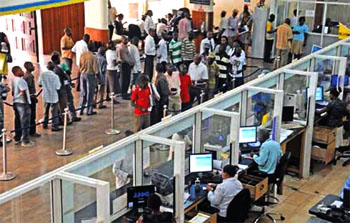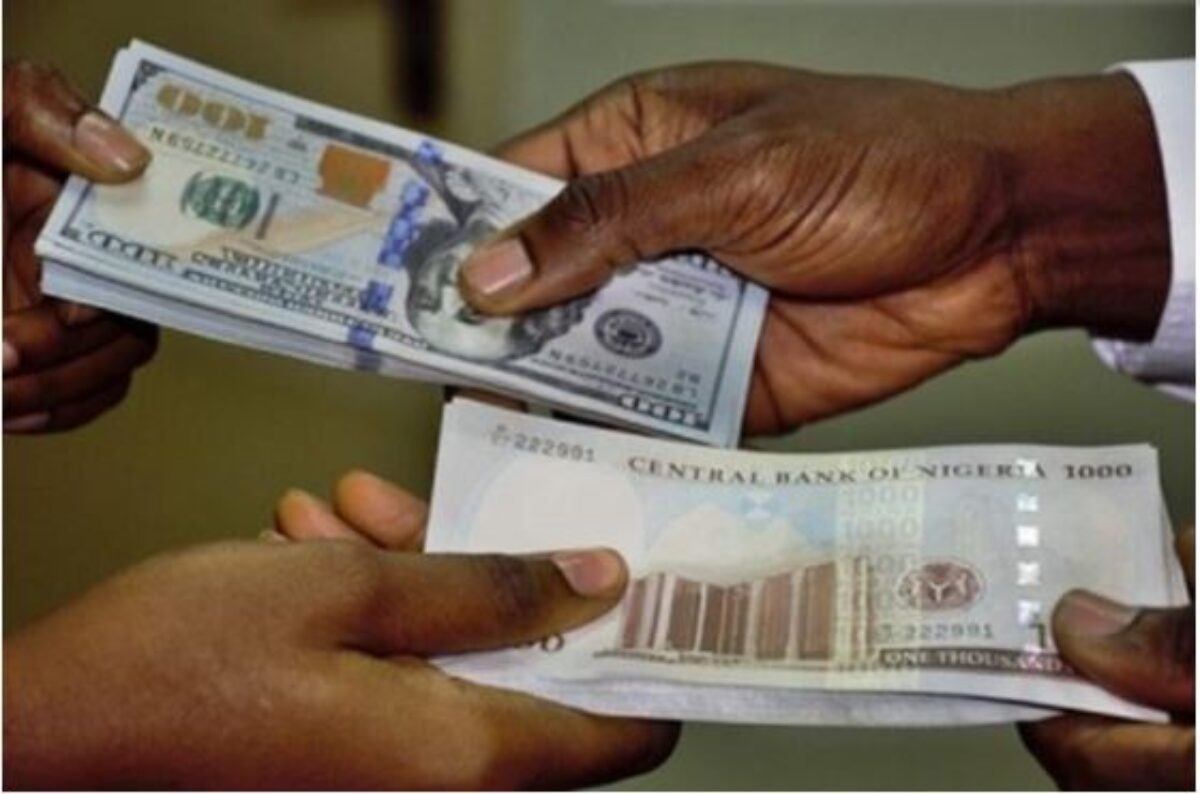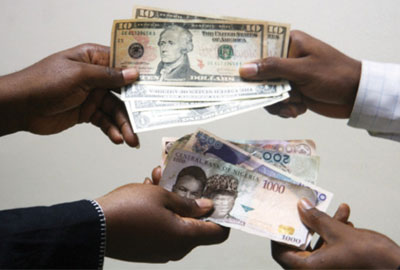Finance
CBN halts branch operations by bureaux de change

…to saction BDCs operating outside registered office
By Jonah Nwokpoku
LAGOS-THE Central Bank of Nigeria, CBN has ordered bureaux de change (BDCs) to close all branches within 90 days, saying branch operations is no longer allowed in the subsector. This directive was contained in the revised guidelines for BDCs released on Friday by the apex bank. According to the guidelines, issued via a circular titled: ‘Revised Operational Guidelines for Bureaux De Change in Nigeria’, “Bureau De Change is Licenced as a unit institution.
No Bureau De Change shall have a branch office outside its registered office. All Bureaux De Change that under the 2002 Guidelines have branches are required to close such branches within 90 days of the 2015 guidelines.”
The CBN also banned BDCs from business relationship with street traders in foreign currencuies. It stated: “Similarly, it shall be a ground for the revocation of Licence should any street trader in foreign currencies be found to have any business relationship with a Licenced BDC.
Application for licence
According to the circular, “A formal application to the CBN Governor to grant the promoters an Approval in Principle to carry on the business of a Bureau De Change in Nigeria (shall be made). The application should be addressed to the Director, Financial Policy and Regulation Department (FPRD), Central Bank of Nigeria. Applicants/promoters shall attach to their application the following documents:
A non-refundable application fee of N100, 000 or such other amount as may be determined by the Bank from time to time in bank draft payable to the Central Bank of Nigeria; Evidence of payment of the prescribed minimum capital of N35 million or any other amount as may be determined by the CBN from time to time, into the designated CBN account. The Bank shall refund this amount with interest after the proposed institution has obtained its final licence;
A copy of the draft Memorandum and Articles of Association; A letter of intent to subscribe to the shares of the proposed Bureau De Change signed by each subscriber; A copy of the list of the proposed shareholders in tabular form showing their business, and residential addresses and the names and addresses of their respective bankers, as well as the details of their Bank Verification Number (BVN).”
It further stated that, “Promoters shall reserve the proposed company’s name at the Corporate Affairs Commission (CAC) as no proposed Bureau De Change shall incorporate/register its name with the Corporate Affairs Commission until an approval-in-principle has been obtained from the CBN, a copy of which shall be presented to the Corporate Affairs Commission.”
Requirements for final licence
The circular further noted, “Not later than six months after the grant of AIP, the promoters of a proposed BDC shall submit application for the grant of a final licence to the Governor, Central Bank of Nigeria, Abuja, with the following documents: Evidence of payment of anon-refundable licencing fee of N1 million only or any other amount as may be determined by the CBN from time to time; the names, designations and signed Curricula Vitae (CV) of the proposed members of the top management; Evidence of incorporation of the company with CAC; evidence of payment of N35 million mandatory caution deposit, or any other amount as may be determined by the CBN from time to time, into a designated CBN account; evidence of having suitable office accommodation for the operation of the proposed BDC.”
Financial requirements
According to the circular, the financial requirements, which may vary at the discretion of the CBN, are as follows: “Minimum paid-up share capital-N35million; Non-refundable application fee-N100, 000; Non-refundable licensing fee-N1 million; Mandatory caution Deposit-N35 million; Non-refundable annual licensing renewal fee [payable not later than30 days after the end of each calendar year]-N250,000; Non-refundable change of name fee-N100, 000”
Operations of bureaux de change
On the operations of BDCs in Nigeria, the circular said: “Every BDC in Nigeria shall deal in bank notes and coins, plastic cards and such other businesses as the CBN may approve from time to time; The foreign currencies dealt in by a BDC shall be derived from private sources and such other sources which may include the CBN window as determined by the CBN from time to time for the purpose of funding Business Travel Allowance [BTA] and Personal Travel Allowance [PTA];
Any person/individual wishing to sell foreign currency above $10,000 or its equivalent to a BDC shall be required to disclose the source; Transactions shall be on spot basis (immediate settlement), adding “For the avoidance of doubt, forward transactions by BDCs are not allowed; The maximum amount per transaction for a BDC shall be determined from time to time by the CBN with respect to business and personal travel allowances.
The maximum amount currently for PTA and BTA per quarter is $4000 and $5000, respectively; All sales or purchases of foreign exchange shall be properly documented and recorded as may be required by the CBN. Such documents should be arranged sequentially and be made available to CBN and other regulatory authorities on demand, etc.”
Ground for licence revocation
The guidelines further stated: “Every BDC shall transact business at its registered office approved by the CBN as any BDC that operates outside its registered office shall be sanctioned. Similarly, it shall be a ground for the revocation of Licence should any street trader in foreign currencies be found to have any business relationship with a Licenced BDC. Every BDC shall fix its hours of business which shall be clearly displayed in its office.
Every BDC shall be required to open both domiciliary and Naira accounts with Authorized dealers in Nigeria and inform the CBN accordingly. The accounts shall be used solely for day to day operations.”
Non-permissible activities
According to the circular, non-permissible activities for BDCs include: “Engaging in off-shore business or maintaining foreign correspondence relationship; Engaging in any trade related import activities; Maintaining a foreign account in whatever form; Round-tripping of foreign exchange [currency] acquired through the CBN window; Street trading of foreign exchange; Carrying on capital market activities; Any other activity as may from time to time be termed “non-permissible” by the CBN.”
It also warned that “Bureau De Change is licenced as a unit institution” And as such, “no Bureau De Change shall have a branch office outside its registered office. All Bureaux De Change that under the 2002 Guidelines have branches are required to close such branches within 90 days of the 2015 guidelines.”
Vanguard
Banking
CBN Denies Currency Devaluation

The Central Bank of Nigeria (CBN) has refuted claims of devaluing the.
Earlier reports suggested that the CBN had devalued the Naira, lowering its exchange rate from N631 to the dollar, compared to the previous day’s rate of N461.60 at the Importers and Exporters (I&E) window.
However, the Central Bank of Nigeria (CBN) released a statement on Thursday through its Acting Head of Corporate Communications, Dr. Isa Abdulmumin, categorizing the report as false information.
In the statement titled ‘CBN Has Not Devalued The Naira’, he said the attention of the apex bank was drawn to the news report by an Abuja based newspaper edition of June 1, 2023, titled “CB Devalues Naira To 630/51”.
However, the CBN stated categorically that the news report was replete with outright FALSEHOODS and destabilizing innuendos, ‘reflecting potentially willful ignorance of the said medium as to the workings of the Nigerian Foreign Exchange Market.’
“For the avoidance of doubt, the exchange rate at the Investors’ & Exporters (I&E) window traded this morning (June 1, 2023) at N465/USS1 and has been stable around this rate for a while.
“The public is hereby advised to ignore the news report by Daily Trust in its entirety, as it is speculative and calculated at causing panic in the market,” the CBN spokesman added.
He, therefore, advised media practitioners to verify their facts from the Central Bank of Nigeria before publishing in order not to misinform the public.
Banking
BREAKING: CBN Increases Interest Rate By 0.5%

The interest rate in Nigeria has been raised to 18.5 percent, up by 0.5 percent, from 18 percent where it was pegged in March 2023.
The Central Banks of Nigeria’s (CBN) Monetary Policy Committee (MPC) resolved to this effect at its third meeting of 2023 in Abuja, on Wednesday.
Governor, CBN, Godwin Emefiele, made the disclosure in the communiqué of the MPC’s meeting, thereafter.
While engaging the media at the end of the two-day meeting, Emefiele, said the committee voted to keep the asymmetric corridor at +100 and -700 basis points around the MPR.
In the view of the MPC, rising inflation rate is traceable to the high energy cost and challenges around the supply chain, among others, which lie outside the corridors of the CBN.
Emefiele said, “The current trend in price development would continue to be monitored by the bank with greater collaboration with fiscal authority to address the drivers of inflation.”
Biztellers reports that the CBN had effected six consecutive interest rate increases, which has seen the rate move from 11.5 percent in March 2022 to 18.5 percent in May 2023.
Finance
Dangers Lurk As Nigerians Resort To Refurbished Gas Cylinders

In Nigeria, people have been forced to come up with creative solutions to cope with the effects of inflation and the economic crisis.
These improvised strategies have not only helped individuals save money, but also enabled them to stay afloat during difficult times.
In a concerning development, the recent trend of boycotting the high cost of cooking gas cylinders in Nigeria may pose a greater risk to lives than it does in terms of saving money.
Economy&Lifestyle investigations have revealed that the soaring prices of gas cylinders have reached a point where it has become increasingly challenging for average households to afford them, let alone refill them with gas.
The situation is further exacerbated by the fact that the pump price of kerosene, which would typically serve as an alternative, has become prohibitively expensive.
Upon investigation, it was found that the prices of gas cylinders vary depending on their sizes. A 3kg gas cylinder is priced at N14,000, while a 5kg cylinder costs N16,000. The larger cylinders are even more costly, with a 6kg cylinder priced at N17,000 and a 12.5kg cylinder costing N19,000.
Additionally, the expense continues when it comes to filling these cylinders with cooking gas, as it costs N2,600 for a 3kg cylinder, N5,200 for a 6kg cylinder, N8,950 for a 10.5kg cylinder, and N10,650 for a 12.5kg cylinder.
Consequently, an average household that needs to replace a worn-out 5kg cylinder would have to come up with N20,250 to purchase a new cylinder and fill it with gas, which can be a difficult feat to achieve.
As a result, many people have resorted to refurbishing their old cylinders and trying to use them as best as they can. However, this approach poses a significant danger.
Mrs. Rukayat Adesoji, a trader, shared her experience regarding her gas cylinder, which had become rusted and could no longer stand upright since last month. Due to the exorbitant prices of purchasing new cylinders, she resorted to seeking the assistance of a welder.
The welder patched the legs of the cylinder, repainted it, and ever since then, she has been using the refurbished cylinder for her cooking needs.
She said ““My gas cylinder which was 6kg got rusted and no longer stands erect since last month. When I asked for the price, I was told it was N17, 500. I was discussing it with a friend who advised me to take it to a welder to paint it and construct a new stand. I heeded to her advice and at the end spent just N3, 000 to turn my cooking gas to a brand new.”
Apart from refurbishing cylinders, some people don’t even know when their cylinders will expire. Mrs. Mercy Opara, a hair stylist, falls in that category as she explained: “I am taking my gas cylinder to the welder to spray it for me. It just cost N1, 500.
“The cost of buying a new cylinder is high. I have been using my cylinder for over 7 years and I don’t even know the expiry date. I just pray God blesses me so that I can buy a new one. But this one I am managing will look neat after spraying it for another two years.”
Mr. Adekanbi Joseph, a wielder, said he paints cylinder and “To paint and rebuild a cylinder stand, I charge N4, 500. Many people come here to paint as a new cylinder is now very expensive to get.”
Highlighting the potential dangers of using refurbished cylinders, Mr. Benjamin Hope, the Chief Executive Officer of FKT Cooking gas and general goods, emphasized the risks involved.
He stated that even a brand new cylinder can pose a risk of explosion if the locks are not properly secured after use or if the cylinder filled with gas is moved from one location to another.
He said “A brand new cylinder can explode if the locks are not well keyed after using and if the cylinder filled with gas was moved from one place.
“There are many reasons for the high cost of gas cylinders in Nigeria. One is the cost of importation due to the exchange rate. Another is the increased migration from the use of kerosene to cooking gas which has necessitated increased demand for gas cylinders. You know that in such a case there will be increased importation of cylinders.”he added


















